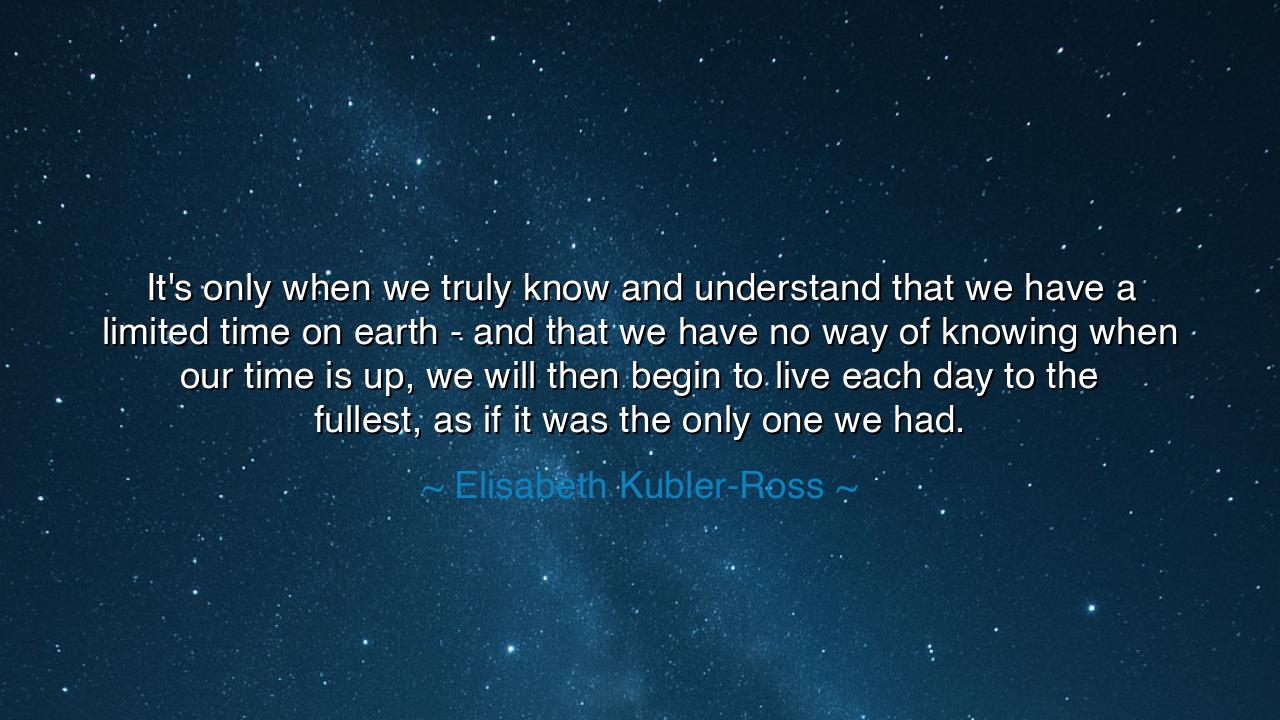
It's only when we truly know and understand that we have a
It's only when we truly know and understand that we have a limited time on earth - and that we have no way of knowing when our time is up, we will then begin to live each day to the fullest, as if it was the only one we had.






“It’s only when we truly know and understand that we have a limited time on earth — and that we have no way of knowing when our time is up — we will then begin to live each day to the fullest, as if it was the only one we had.” So spoke Elisabeth Kübler-Ross, the wise physician who gazed deeply into the mystery of life and death. Her words are both a revelation and a summons — a reminder that the shadow of mortality is not meant to sadden us, but to awaken us. For she, who walked among the dying, learned the secret that so many of the living forget: that awareness of death gives birth to the art of living.
Kübler-Ross devoted her life to understanding the final passage of existence. She tended to those who stood upon the threshold of eternity, and she listened to their final words, their last longings, their regrets. And from them she learned a truth that thundered through her heart: men begin to live fully only when they remember they are mortal. When the illusion of endless time fades, the eyes of the soul open. The small things — a child’s laughter, a sunrise, the scent of rain — regain their sacredness. For when we know that every breath may be the last, every breath becomes precious beyond measure.
This truth was not born with her; it is ancient as humankind itself. The philosophers of Greece and the sages of the East all spoke of it. The Stoics called it memento mori — “remember you must die” — not as a dirge, but as a discipline of the heart. They taught that death is not the enemy, but the teacher. The samurai of old Japan meditated on their mortality each morning, so they might act each day with clarity and honor, unburdened by fear. And even in the sacred texts of many faiths, we are told that “the number of our days we know not; therefore teach us to count them wisely.” For to live without remembering our end is to drift half-asleep through the miracle of existence.
Consider the life of Randy Pausch, the professor who, when told he had only months to live, delivered his now-famous “Last Lecture.” Knowing his time was short, he did not sink into despair — he became radiant with purpose. He spoke of wonder, of dreams, of love; and though his body failed, his spirit shone like a torch. “Time,” he said, “is all you have. And one day, you may find you have less than you think.” His joy was fierce because it was conscious; he embodied what Kübler-Ross taught — that the certainty of death can ignite the fire of life.
What Kübler-Ross sought to teach us is that death is not merely an ending, but a mirror. When we look into that mirror, we see what truly matters. Wealth fades, fame vanishes, possessions turn to dust — but love, kindness, courage, and the simple beauty of presence endure in the memory of others and in the peace of our own hearts. Those who deny death chase shadows; those who accept it learn to walk in light. For the brevity of life is not a curse — it is a gift, a divine urging to live deeply, to waste no moment, and to love without hesitation.
Thus, the message of this quote is both humbling and exalting: to live fully, you must live consciously. Each day must be greeted as if it were the only sunrise you would ever see, each word spoken as if it were the last you would give. Forgive quickly, speak truthfully, love fiercely. Do not postpone joy for a future that may never come. For the tomorrow we assume is not promised, and every heartbeat is a blessing unearned.
So, my child, remember this teaching: let death be not your terror, but your teacher. Let it sharpen your gratitude, awaken your compassion, and summon your courage. Live each morning as if the dawn itself were a miracle; walk each day as if heaven were beneath your feet. Do not seek to escape mortality — embrace it as the compass that points to what is most sacred. For when you truly know that your time is limited, you will cease to merely exist — you will begin to live. And in that awakening, you will find what all the sages have sought: not the denial of death, but the eternal joy hidden within the fleeting moment of life.






AAdministratorAdministrator
Welcome, honored guests. Please leave a comment, we will respond soon